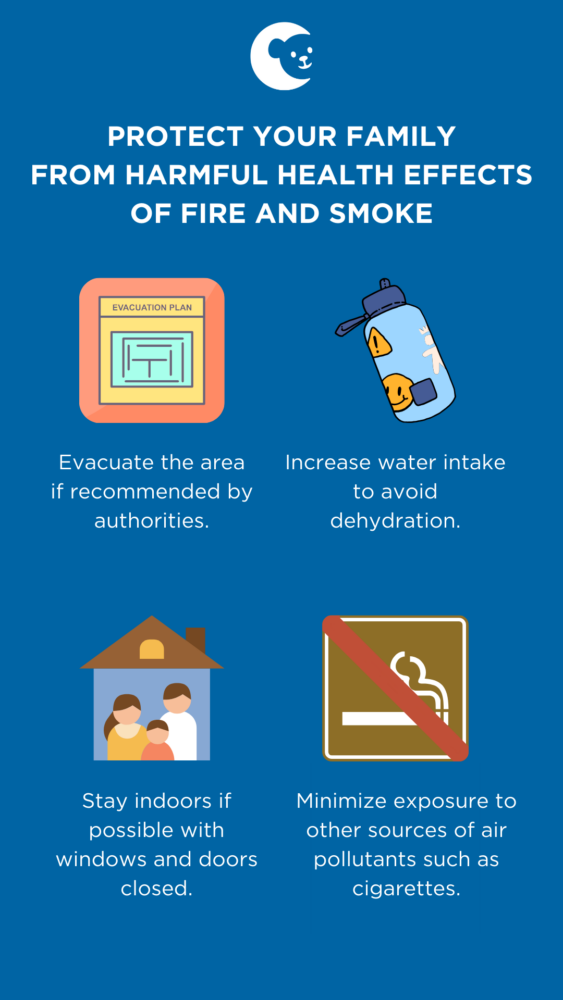With powerful winds and an increased number of wildfires in California, it’s understandable that children may experience emotional distress, even if their home or community is not physically affected.
The unpredictable nature of wildfires, coupled with the harmful effects of strong winds, can create a challenging environment for children to navigate.
Dr. William Adelman, the medical director of the CHOC Primary Care Network shared, “When the wind blows, it can carry pollen, dust, and other allergens over long distances, increasing their concentration in the air. This can trigger allergic reactions and asthma symptoms in sensitive individuals.”
Additionally, high winds can stir up mold spores and other irritants, further aggravating respiratory conditions. If you have asthma or allergies, it’s important to monitor weather conditions and take preventive measures, such as staying indoors on windy days, using air purifiers, and keeping windows closed to reduce exposure to airborne allergens.
Here are 11 tips from The National Child Traumatic Stress Network and CHOC experts that can help parents and caregivers support kids in coping with the growing concern surrounding wildfires:
Know these responses are common
Children may feel additional fear and anxiety during a wildfire – and even long after it is extinguished. Separation anxiety is common, and children may show changes in appetite, school performance and mood. Older children may show an increased likelihood for self-harm and younger children may exhibit regressive behaviors, or showing behaviors they used when they were younger.
Limit media exposure
Monitor children’s media consumption – on television, newspapers, radio and social media. Images of burning buildings or the aftermath of a wildfire could be frightening to children, as could reading or hearing accounts of the fire. Learn more about the importance of monitoring your child’s news and social media intake.
Monitor adult chatter
Remember that children can overhear conversations between their parents and other adults. They might also misinterpret this information or be afraid of something they don’t understand. Keep conversations in front of children light and save heavier discussions for private.
Encourage open communication
Children may have questions about the fires – and they may ask them multiple times. Encourage kids of all ages to ask these questions as many times as they need. Use this time to address any misinformation your child might have picked up at school or elsewhere.
Provide age-appropriate information
Limit the information that you provide to your child to the questions that they ask you, to avoid overwhelming them with information that they may not already have been exposed to. Keep in mind their age and emotional maturity when answering.
Remind your children that they are safe
Share your family’s plan to keep safe. Show them where your smoke detectors are located; teach and remind them what to do if those alarms go off. Also, remind children that firefighters and other emergency personnel are working hard to protect them and their homes.
Maintain routines and expectations
Routines are essential to helping children feel safe and secure. Stick to regular schedules, mealtimes and bedtimes as best as possible and ensure children get enough rest, nutrition and exercise. Try to stick to family rules around practicing good behavior, respect and kindness, as well as other family norms, to keep a sense of normalcy.
Increase your patience
Even with routines and rules still in place, practicing flexibility and patience will be key. Distressed or distracted children might need help or additional reminders about chores and responsibilities.
Provide additional support at bedtime
Fears and anxiety could be heightened at bedtime. To avoid your child developing separation anxiety, try to spend more time with them doing light, peaceful activities like reading a book or singing songs. If a child needs to sleep with their caregiver, it’s OK. Just be clear that typical sleeping arrangements will resume in the future.
Model behavior
A parent’s crisis response will significantly influence how children respond. Remember to take care of yourself as well by eating well, sleeping well and exercising. Support your partner or other adults in your life, and, if possible, delay making any hasty decisions during a stressful time.
Read a book
Your child may feel more comfortable opening up about their feelings over the fire by reading a book where the characters experience a fire as well. “Trinka and Sam: The Big Fire” is available for download in English and also available for download in Spanish from The National Child Traumatic Stress Network.
Many of the above reactions are normal after children are exposed to something traumatic like a fire. Parents may wonder at what point their child needs further support from their pediatrician or mental health provider. Generally if these responses continue more often than not for over two weeks and interfere with normal activities —such as school — or with sleeping or eating, then it may be time to reach out to your child’s doctor or a therapist.


Mental Health Education Program (MHEP) webinars
Get mental health resources from CHOC pediatric experts
The mental health team at CHOC curated the following resources on mental health topics common to kids and teens, such as depression, anxiety, suicide prevention and more.





